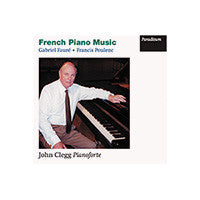French Piano Music
Despite his enormous output Fauré’s music, apart from the Requiem, has remained largely neglected by all but those who recognize his discreet, refined voice. He had difficulty in finding recognition from the outset but recognition did come eventually and until the arrival of Debussy he was regarded as the master of French piano music.
Poulenc’s style is characterized by its sophistication and romantic lyricism. There is a love of jazz idioms and bright colours. Rhythms are strong and clear and the harmony, while largely diatonic, can be novel and coloured with dissonance. In this respect and by his own admission, he was no innovator, but content to build on foundations that were already in place.
Track Listing
| Gabriel Fauré | ||
| Impromptu, Barcarolles and Nocturnes | ||
| 1 | Nocturne No 3 | 4:25 |
| 2 | Barcarolle No 3 | 8:04 |
| 3 | Nocturne No 5 | 7:57 |
| 4 | Impromptu No 3 | 4:28 |
| 5 | Nocturne No 6 | 7:35 |
| 6 | Nocturne No 11 | 5:03 |
| 7 | Barcarolle No 9 | 4:13 |
| Francis Poulenc | ||
| Improvisations Éd. Salabert (1934, 58) | ||
| 8 | Improvisation No 7 | 2:16 |
| 9 | Improvisation No 8 | 1:44 |
| 10 | Improvisation No 13 | 2:41 |
| 11 | Improvisation No 14 | 1:30 |
| Nocturnes Heugel, Paris (1932, 34, 36, 39) | ||
| 12 | Nocturne No 1 | 3:27 |
| 13 | Nocturne No 4 | 1:36 |
| 14 | Nocturne No 7 | 2:00 |
| 15 | Nocturne No 8 | 1:47 |
| Thème Varié | ||
| Éditions Max Eschig (1952) | ||
| 16 | Thème | 1:08 |
| 17 | I Joyeuse | 0:22 |
| 18 | II Noble | 1:05 |
| 19 | III Pastorale | 1:24 |
| 20 | IV Sarcastique | 0:39 |
| 21 | V Mélancolique | 1:08 |
| 22 | VI Ironique | 0:45 |
| 23 | VII Elégiaque | 1:34 |
| 24 | VIII Volubile | 0:40 |
| 25 | IX Fantasque | 0:36 |
| 26 | X Sybilline | 0:44 |
| 27 | XI Finale | 2:28 |

